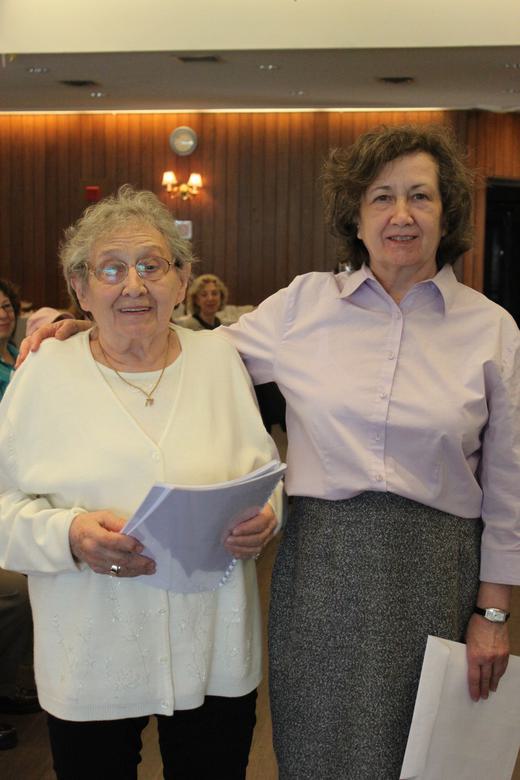Judit Simai
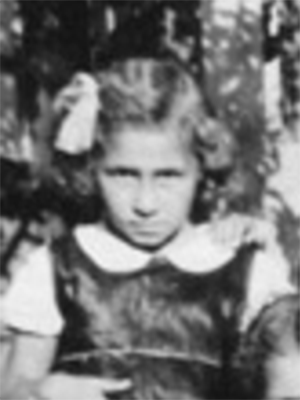
Born: Mátészalka, Hungary, 1928
Wartime experience: Ghettos and camps
Writing Partner: Eva Rosenbaum
Judit Simai (née Kepets) was born in Mátészalka, Hungary, in 1928. In 1934, she moved to Debrecen with her parents and three siblings.
A few months after Germany invaded Hungary in March 1944, Judit and her family were forced to move into the Debrecen ghetto and brickyard. From there, they were deported to Austria as forced labourers. After working in Vienna for eight months, Judit and other forced labourers were sent on a death march to the Mauthausen concentration camp, and then to the Gunskirchen concentration camp. Judit and her family were liberated by the US army in May 1945, after which her mother died of typhoid fever. Judit returned to Mátészalka with her father and siblings. She married in 1948 and raised a family in Mátészalka until the 1956 Hungarian Uprising, when they left for Budapest. In 1976, Judit and her family moved to Toronto to join her eldest daughter. Judit worked at a bakery for twenty years, until her retirement. Elizabeth and Leo. Place and date unknown.
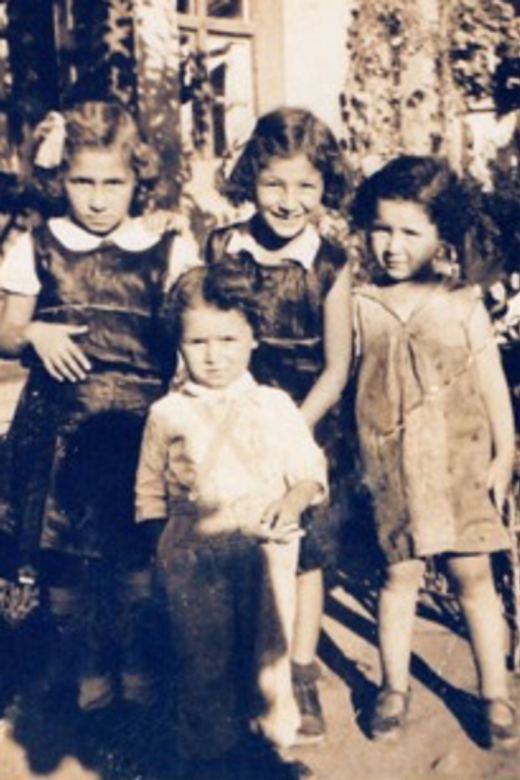
From Vienna to Mauthausen
After the Germans arrived, they ordered us to move into the ghetto, which was an enclosed area of several streets in the Jewish neighbourhood. This is where all Jews of the city had to live. The non-Jews who had lived there before left and moved into their choice of the nice empty houses Jewish families had to leave behind.
I was sixteen years old, and my brother, our youngest sibling, twelve. Our family was given a flat with one room and a kitchen. Smaller families had to live with two or three other families in one apartment. We stayed there for a few weeks and made do with whatever few possessions and the little food we had brought with us. My mother would cook soup or potatoes. There were others, especially the elderly, who did not have enough food, and they starved to death.
We had a cat that my brother, Pista, liked very much. He was very upset that we had to leave the cat behind when we moved into the ghetto. Then a small miracle happened. About two weeks after our move, we heard a familiar sound. We could hardly believe it, but our cat had somehow found its way to us! We were able to keep it until we were ordered to move again, when we were told to get onto the trucks that were waiting on the streets of the ghetto.
We were taken to a brick factory. There must have been thousands of people there already. We stayed there for a short time, sleeping outside on the ground, and getting something to eat once a day.
This is where the trains started out from. One day it was our turn to be put on a train — eighty of us crammed into a wagon. When we got to the Czechoslovakian border, the train stopped and didn't move for about a day. We were guessing that maybe the tracks were bombed out. The train then turned around and we ended up in Vienna, Austria. There, we heard that most other trains from the brick factory went to Auschwitz, a death camp.
A few years ago, I read the book Kasztner’s Train, by Anna Porter, and then I realized that our train must have been one of those sent to Austria instead of Auschwitz, thanks to Kasztner’ s arrangements with the Nazis, as well as other factors. We were one of the luckier ones — chosen for work instead of going directly to the gas chambers.
We were housed in a school in a suburb of Vienna called Floridsdorf. From there, we went to work every day for eight months. Our job was to collect and clean usable bricks from houses that had been bombed, and could have collapsed at any minute. It was a dangerous job.
The residents of Vienna were mostly kind to us. They brought us food, like bread or chocolate, from time to time. There was one gentleman who especially liked Anna, my younger sister, and tried to help our family. He gave us a bottle of Ovaltine, a vitamin-fortified beverage powder. Our mother gave each of us children a spoonful of it every day, and it lasted for quite a while. I think it may have saved our lives. The man even offered to hide our family when the Germans ordered us to leave Floridsdorf, but our mother didn’t want to stay. She said we had to go where all the other Jews were going, that this was our fate. Our mother was very religious. She even sometimes managed to light candles for Shabbat in the work camp.
One morning we were lined up, about eight hundred of us, and we started walking by the bank of the Danube. Our forced march from Floridsdorf to Mauthausen took about a week. Before we left, men and women were separated. Our family managed to stay together because our father dressed up as a woman, wearing a kerchief on his head, and putting on one of my mother’s dresses.
Only about half of the group reached Mauthausen; the others got sick and died or were shot by the Nazis on the way. The corpses were thrown onto one of the many trucks that came with us. These were the same trucks we were told to put our belongings in before we left.
We stopped walking only at night, when we slept outside by the road. One night, we were taken to a prison and put in cells. Our family was all in one cell. One of my sisters kept yelling and banging on the door all night. We thought this was the end for us, but in the morning, we were let out and continued our march to Mauthausen.
We were always hungry. We had some leftover food with us, but it wasn't enough. During the march, we would pick up thrown-away crusts of bread or potato peels from the roadside or from garbage bins.
When we arrived at Mauthausen, we saw a long, deep ditch ahead of us. First we thought this was for baggage, but when we got closer, we realized that there were people in there, mostly dead, some still moving.
Desperation and Death
When we arrived at Mauthausen, we saw a long, deep ditch ahead of us. First we thought this was for baggage, but when we got closer, we realized that there were people in there, mostly dead, some still moving. The guards ordered us to find a place on the ground next to the ditch because there was no more room in the barracks.
We saw the “stairs of death,” the dangerous stairs connecting the camp with the quarry, where the labourers worked. We saw the gas chamber. We saw the black smoke coming from the chimney of the crematorium and smelled the horrible smell of human flesh burning. This is where we lived for weeks, among many dead and starving people.
Our breakfast was some dark, thin liquid — supposedly coffee — and a small piece of bread. For lunch we would get some cooked vegetable-like dish, mostly peels, which the Germans called Dörrgemüse. In the evening we would get some soup and maybe another small piece of bread. Everyone tried to get to the end of the line, where there was more chance of getting some solid food from the bottom of the pot. Sometimes we tried to save a bit of our bread portion for the next day, putting it under our pillow. Often, it was gone by the morning, stolen. Everyone was desperate to find something to eat.
After a few weeks in Mauthausen, we were forced on foot to Gunskirchen. In his memoir, The Shadows Behind Me, Willie Sterner describes the horrible conditions in the Mauthausen and Gunskirchen concentration camps, and on the march from one to the other, which was exactly as I experienced it. I would have liked to have met with Willie and his wife, Eva, in Montreal because we may have met each other at these camps.
In Gunskirchen we were put into barracks. There were no empty beds, and we had to sleep on the floor. By this time, all the inmates of the camp were infested with lice. When we needed to go out of the barracks to use the latrine, we had to step over many corpses. We also passed by naked men scratching their groins to try to get rid of the lice. My father would always go with my mother, trying to shield her from seeing the men.
We often went to the riverbank at the edge of the camp to look for snails. We would pick them up from the shore or out of the water and boil them on a stone stove in the pots some women at the camp had, eating them when they came out of their shells. Whenever my children or grandchildren point to a snail, taking pleasure in looking at it, it is this that I remember, and I tell them about it. Snails might be a delicacy to some, but we ate them out of desperation. My parents always kept kosher at home. During the Holocaust, we were just trying not to starve.
American soldiers liberated us in May 1945. We went to Hörsching, near Linz, where there was a displaced persons (DP) camp. Our family was given a small apartment and met one of our cousins there.
My mother was the first among us to get sick with typhoid fever. We thought it may have been caused by the dead horse she, along with many others, ate while on the march. This was not even the worst possible food. During our last days at the camp, we saw human corpses with some of their flesh missing.
Our mother was taken to a makeshift hospital close to our apartment. Soon after that, all of us children got sick too and went to the hospital. We all had high fevers and were at times unconscious or hallucinating. Our father was spared because he was immune from when he contracted typhoid fever in Siberia.
My siblings and I eventually recovered. Our mother, however, died there. She had given us all the vitamin powder she had received back in Vienna and didn't take any herself. Maybe this is why she didn't survive.
When we got strong enough, we went back home to Hungary, to Mátészalka. After our liberation we were all left with pain in our hearts forever because so many of our relatives never came back — grandparents, cousins, aunts and uncles — and we knew that they had been murdered. Among the murdered were my maternal grandparents from Erdőbénye, near the Tokaj Mountains. I remember their beautiful vineyard and my grandfather with his long white beard sitting at the table studying Torah. Two of my mother's three sisters and their brother also perished, as well as eight of my father's nine siblings.
When we got home, we didn't talk about what had happened to us because everyone went through the same things. We all knew. We wanted to get married, start a family and start living.
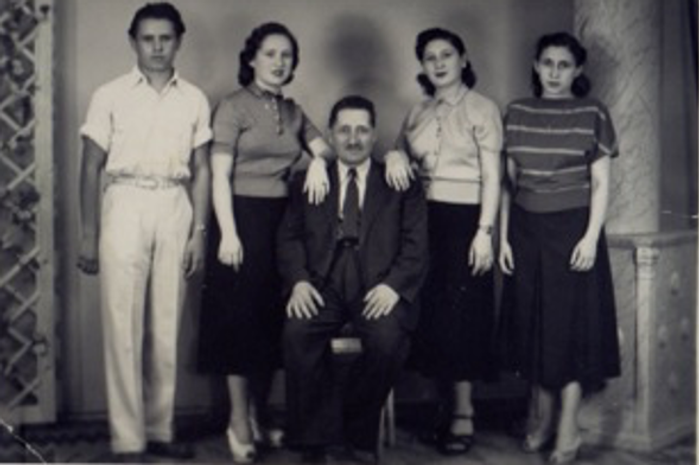
Judit (far right) with her siblings and her father after the war. From left to right: Pista, Anni, Herman, Ági and Judit. Hungary, date unknown.
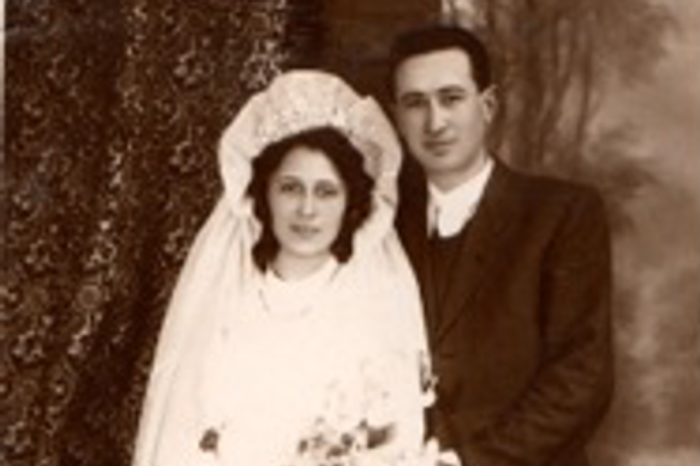
Judit and her husband, Miki (Miklos), at their wedding. Mátészalka, Hungary, 1948.
In Canada
We arrived in Canada with our two other children in December 1976. It was very difficult for me to adjust to this new life. Our family was together, but I was homesick, missing friends and neighbours, the city I loved and the language I knew. It took me years to finally adjust, and a near-tragedy to come to terms with us changing countries.
My sister and her husband helped us get jobs as soon as we got here; I worked at their faux-fur factory for a year, and my husband was hired by Olympia Tile to work in the warehouse. I also took English classes, cashier training, and began to read English books. Within two years of our arrival, I was able to take a job at Open Window Bakery as a salesperson. I worked there for twenty years until my retirement at seventy-one. My husband, Miki, stayed at Olympia, was promoted to be warehouse checker, and worked there until he was seventy-seven. We worked hard and lived frugally. Eventually we were able to buy a car and a condominium, which we enjoyed. Miki went to synagogue on Saturdays and Jewish holidays. We met with many of our old friends and acquaintances from Mátészalka who had also immigrated to Canada. Miki was even reunited with one of his friends he had been with in the Hungarian military forced labour service.
We saw our two other children get married as well, and were happy that all three of our children had kind and supportive spouses, and lived comfortable and fulfilling lives near us, in Toronto. We took pleasure in our five grandchildren.
***
In 1989, my younger daughter, Ági, suffered a ruptured brain aneurysm and her life was saved by surgery. I doubt that she could have been saved if this had happened in Hungary at that time. This is what finally convinced me that coming to Canada was the right choice. The political and economic hardships and growing antisemitism in Hungary today also strengthen my changed outlook.
In 2009, I lost my husband to cancer, after sixty-one years of marriage. This was a terrible blow for me. I am still struggling with trying to live my life without him. He was quiet, kind and loving. Everyone who knew him remembers his smile and misses him.
***
I am now almost eighty-five years old, and I have suffered a lot in my life. My siblings and I, and our spouses too, lived through the Holocaust and lost loved ones. We went through major life changes and difficult circumstances, yet we were able to go on, work hard and raise our families. We succeeded in giving our children greater opportunities and a better life than what we had. This is what gave meaning to our lives. I hope that nothing will happen that could jeopardize their future.
